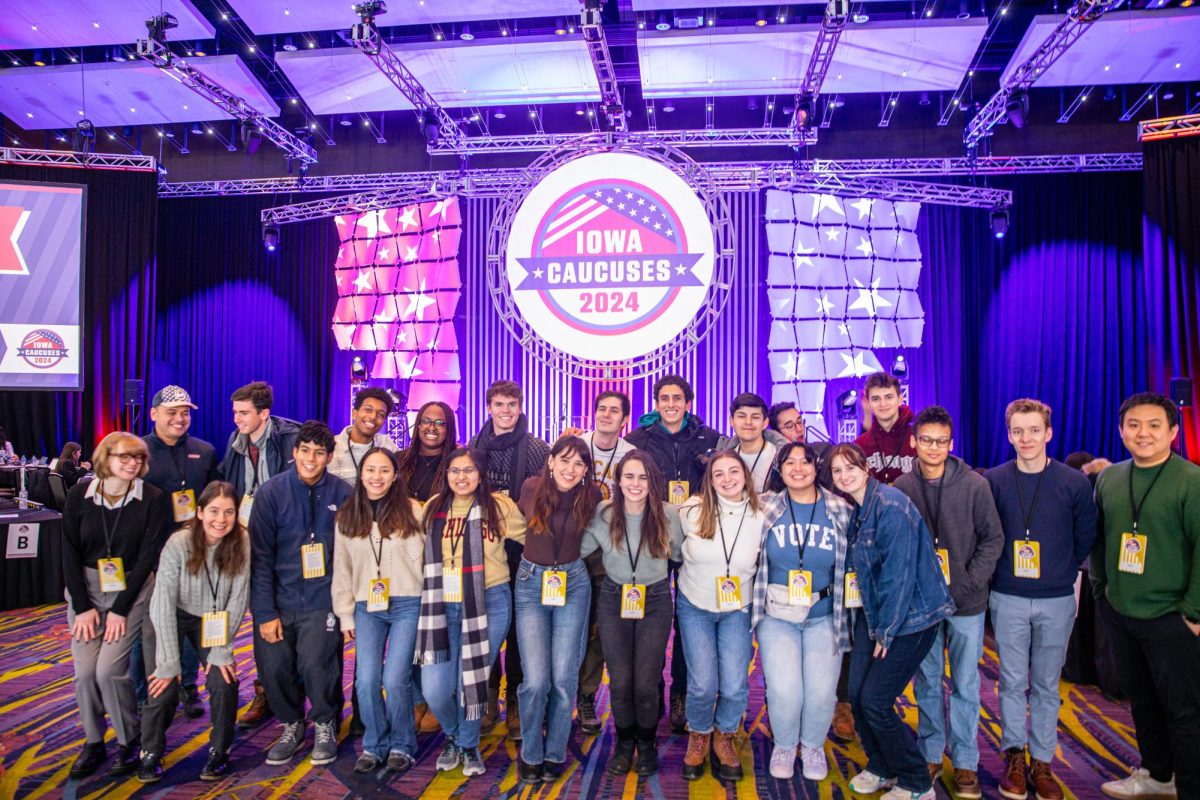The Iowa Caucus Trek, organized each U.S. presidential election year by the Institute of Politics (IOP), took place from January 14 to 16. This year, only the Republican primaries in Iowa involved in-person caucuses, while the Democratic primaries in Iowa are still ongoing and are being held through mail-in ballots instead of caucuses.
Students who participated in the trek spoke to important voting blocs, political organizers, and Iowa state legislators. They also had the opportunity to visit the Republican candidates’ campaign headquarters. According to the IOP’s Instagram page, 27 students were selected to attend the trek out of nearly 90 candidates from a range of schools across the University.
“It’s a unique, once-in-a-lifetime opportunity to see that democratic process in action. It differs greatly from the traditional primary voting process,” Purvi Patel, director of civic and campus engagement at the IOP, said of the caucuses. “It also can be incredibly critical to shaping the contours of the presidential election.”
Caucuses involve a private gathering of voters affiliated with a certain political party, at which participants express support for their chosen candidate, including through speeches. Participants’ choices to support candidates are often public at caucuses, as opposed to the secret ballots that a primary election involves.
In addition to organizing the Iowa Caucus Trek during election years, the IOP hosts treks and opportunities surrounding the Republican and Democratic National Conventions, as well as Speaker Series events related to the elections.
First-year Alex Fuentes spoke to The Maroon in an interview about his experience on the Iowa Caucus Trek.
“I don’t necessarily agree with the views of a lot of the people in Iowa, but it gave an opportunity for me to understand the passion that goes into people like Trump,” Fuentes said. “I think it was very crucial in understanding the political process in Iowa.”
Many students who participated in the trek said it was an opportunity to engage with people and perspectives that they wouldn’t otherwise have.
“One of the good things about the trek was that it gave [students] a connection to normal people, especially to rural people,” third-year Christopher Phillips said. “I think it left a good impression on the students, myself included.”
The Maroon also spoke to first-year Lucas Kult-Banout. “Being at a Trump rally was something that I never thought I would do. It was a super unique experience,” he said. “You get to see that on one hand, these people are very similar to you. At the end of the day, they’re kind of just people, but they also have these beliefs that you have to reckon with because they are so opposed to what you believe.”
The trek included visits with farmers from Iowa Corn Growers Association (ICGA) and Iowa Pork Producers Association (IPPA). According to ICGA’s website, the organization “serves as the collective voice for Iowa corn farmers, lobbying on agricultural issues at the state and federal level.”
Third-year Divya Mehrotra said she appreciated these visits. “I absolutely enjoyed hearing from them. It really revealed how important the agricultural sector is in Iowa,” she said. “It was interesting to me to hear from them on how special interest groups… process what presidential campaign candidates are saying to them. How do they determine what’s genuine, what’s not genuine, what their priorities are, and whether a candidate is meeting those priorities?”
Another notable aspect of the trek for students was seeing the technical logistics of presidential candidates’ campaigns, including targeted data-backed efforts aiming to increase voter turnout. Students also met with political pollster Anne Selzer, who is known for highly accurate polls of Iowa voters.
“We had a conversation with her about her statistical methods, why she’s so accurate in these areas, and a bit of her polling process,” Fuentes said. “That was very interesting because it was probably the most objective and most statistical analysis area of the Iowa caucus.”
Fuentes said that the collective deliberation and decision-making he saw at the caucuses made an impression on him.
“Seeing this Republican Caucus, it’s almost very casual. The person who was running the caucus had a lot of jokes that brought a lot of people together, and they felt connected,” he said.
Third year Juan Leal expressed a similar sentiment regarding his experience at the caucuses. “That’s when politics stops being readings, speeches, or numbers, and it becomes… a practice of people coming together for something that they believe in,” he said.









